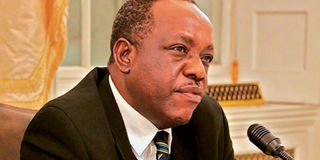Magufuli’s Cabinet leanest in 20yrs, 7 JK ministers back

Prof Sospeter Muhongo
What you need to know:
- In comparison with his predecessors, Dr Magufuli has led the government without ministers for the longest period, clocking 35 days after he was sworn in as president of Tanzania
Dar es Salaam. President John Pombe Magufuli’s Cabinet of 34 members which he unveiled yesterday is the smallest in 20 years.
Dr Magufuli has slotted 18 cabinet dockets with 19 ministers and 15 deputies. However, the smallest cabinet in the history of this country was the 11-man team formed by the late Father of the Nation Mwalimu Julius Nyerere after independence.
In 1985, Ali Hassan Mwinyi succeeded Mwalimu Nyerere as the president of Tanzania and formed a cabinet of 28, which comprised 20 ministers and eight deputies.
In 1995, then President Benjamin Mkapa formed a Cabinet of 37 people; 27 ministers and 10 deputies that included incumbent President John Magufuli.
The biggest Cabinet of all was formed by former President Jakaya Kikwete in 2005.
The immediate former president’s cabinet comprised 29 ministers and 31 deputies.
In comparison with his predecessors, Dr Magufuli has led the government without ministers for the longest period, clocking 35 days after he was sworn in as president of Tanzania.
President Mwinyi named his cabinet in under a week (five days) while Kikwete took only a fortnight to announce his cabinet.
Even by taking more time to craft his team, for the first time in 54 years of independence, the Cabinet has been named with vacant dockets. Out of 18 ministries that he formed, four are yet to be filled with ministers.
They are the ministry of Finance; ministry of Education; ministry of Works, Transport and Communications and the ministry of Natural Resources and Tourism.
Dr Magufuli’s cabinet also has only three female full ministers similar to Mr Mkapa’s (the number might rise if a female minister is appointed to fill the three vacant dockets), but slightly lower than Mr Mwinyi’s which had four, and Mr Kikwete’s which had five.
Generally, seven of Mr Kikwete’s ministers have returned in Magufuli’s cabinet, out of which four have retained their dockets Prof Sospeter Muhongo (Energy and Minerals), Dr Hussein Mwinyi (Defence), Jenister Mhagama (Prime Minister’s Office) and William Lukuvi (Lands, Housing and Human Settlements Development), and three others have been assigned different dockets namely George Simbachawene, Dr Harrison Mwakyembe and Prof Makame Mbarawa.
Six of Mr Kikwete’s deputy ministers have been promoted to full ministers by Dr Magufuli, they are Ummy Mwalimu, Mwigulu Nchemba, Charles Mwijage, January Makamba, Charles Kitwanga and Angela Kairuki.
Meanwhile, eight of Kikwete’s ministers who have managed to retain their Parliament membership have been dropped from the Cabinet by Dr Magufuli. They are Lazaro Nyalandu, Saada Mkuya, Prof Jumanne Maghembe, Dr Shukuru Kawambwa, Dr Mary Nagu, Hawa Ghasia, Sophia Simba and George Mkuchika.




